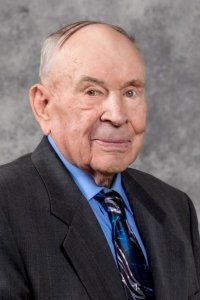
Eminent Farmer
County: Codington
Codington County farmer Orrin Korth has contributed to the good of South Dakota agriculture in many ways. He has also been an innovator in both crop and livestock production.
“I grew up helping my father, Otto, on the farm that was homesteaded by my great-grandfather in 1885 and knew I wanted to get a college education to be able to come back and apply what I learned to diversify and advance our farm and help our community,” Korth says.
He decided to attend South Dakota School of Agriculture, now South Dakota State University, and graduated in 1942. He then moved back to what is now ‘Korth Farms’ and bought some of his own land a quarter mile down the road.
After returning, he gradually took over leadership in the operation. He grew small grains, corn, soybeans, flax and sunflowers. He also raised registered and certified seed and provided a seed cleaning service to help prevent the spread of weeds.
“I wanted to be sure that South Dakota farmers had the best performing seed to plant,” he explains.
His family purchased two threshing machines to sustain their farming operation and help area farmers as farm labor was sparse during the war.
“Community is important to us and we all looked out for one another, especially when times were tough,” Korth says.
Korth was also very involved in livestock production. He was a leader in the area in raising Aberdeen Angus cattle. He also raised purebred Corriedale sheep and sold breeding stock. He showed his livestock at events around the state.
Korth has long been a strong supporter of conservation, with a primary focus being his advocacy for planting trees. He began planting trees on his farm in the early 1930s and oversaw efforts for the eventual planting of four miles of single-row shelterbelts on Korth Farms.
Alongside his late wife Lorraine, they raised five children on the farm: Kelvin, Kim, Kathryn Feltch, Karla Moes and Kristie Lagodinkski. They now have eight grandchildren.
Today, Korth lives on the farm that is now run by his sons, Kelvin and Kim. The farm has continued to be a profitable operation over the decades.
On Korth Farms sits the family’s iconic orange barn that is well-known by the community. The family has hosted an old-fashioned barn dance for the community since 2013 in the refurbished barn built by his father in 1934.
Korth has always been a very active member of the community. He was a charter member of the Sioux Valley Coop and served as a board member for several years. He also served as a regional director of Farmers Union Central Exchange, now known as Cenex Harvest States.
In the mid-1950s, Korth learned that SDSU was seeking a place to do research in northeast South Dakota. He provided 25 acres of his choice farming land for the college to conduct research to assist farmers in northeast South Dakota and the entire state. The farm is still in use today as the Northeast Research Farm and has grown to over 125 acres. Orrin has served for 60 years on the farm’s advisory board.
When SDSU was developing the Ag Heritage Museum in the 1970s and considering moving into the old livestock pavilion, they were in need of a focal exhibit.
“I volunteered a Case steam engine that my dad owned to be the focal point at the museum. I believe it is important to tell the story of agriculture and wanted to contribute,” Korth says.
He has since donated several additional antiques of significant value to the museum.
Faith has always been an important part of Korth’s life, as well. His faith impelled him to develop a scholarship for seminary students of the Wisconsin Lutheran Church Synod.
“I want to help support students to stay in ministry and the church,” Korth says.

